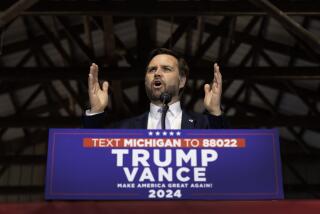As the French debate their identity, some recoil
- Share via
Reporting from Saint-Quentin-En-Yvelines, France — It was one of a series of government-run public debates aimed at defining the values that constitute French national identity.
But in this middle-class suburb west of Paris, the discussion last week quickly turned into a cacophony of hot-tempered accusations.
Rather than give his version of what it means to be French, an invited speaker, historian Jean-Yves Mollier, attacked his host (who sat stone-still a few feet in front of him) for supporting the national dialogue. Mollier said the ongoing debates represent none other than Vichy-style propaganda attempting to “stigmatize” those who don’t fall into France’s ruling native caste, in this case mostly French Muslims of immigrant origin.
Mollier and several other attendees proceeded to walk out. Meanwhile, two actors disguised as avid participants launched into a faux back-and-forth.
“Today, I’m ashamed of being French!” said one of the men, standing up to be heard.
The other, jumping to his feet, replied, “Excuse me, but I’m proud of being French, and you, you should be ashamed of being proud of being ashamed of France!”
“It’s a shame for France!” shouted back the first.
“I’m proud of the shame I feel for people like you who are ashamed of being French!” cried the second.
In the crowd, one middle-aged man’s face turned the color of his pink shirt. He termed the scene “disgraceful.”
Host Anne Boquet, the local police chief, expressed her hope that the dialogue would “remind people of their Republican values and to respect authority.”
“The debates can introduce that respect,” she said, and help “define the face of France we like today.”
That, it seems, may be a long way off.
The 3-month-long national debate series, spearheaded by conservative President Nicolas Sarkozy and his minister of immigration, has been the subject of heated controversy since a late November vote in Switzerland to ban the construction of minarets on mosques.
Sympathy for the Swiss vote here, according to polls, has helped focus the debates, which began in November, on widely held demands that Muslims do more to blend into French society.
Polls show that a small majority in France favor a ban on minarets like the one the Swiss approved with a 57.5% majority.
Sarkozy recognized that view in an editorial in Wednesday’s Le Monde: “Instead of condemning . . . the Swiss people, let’s try to understand what they wanted to express, and what so many people in Europe feel, including the French. . . . Europeans are welcoming and tolerant, it’s in their nature and in their culture. But they don’t want the nature of their way of life, their mode of thinking and social makeup to be distorted.”
Sarkozy has defended the debate series as a means for the French to let out suppressed feelings about their national identity. “It’s by becoming deaf to the cries of the people, indifferent to their difficulties, their feelings, aspirations, that we nourish populism,” he wrote. “Nothing would be worse than denial” that the French and Europeans “feel that they are losing their identity.”
But not all agree.
Mollier, for one, claims the debates have proved decidedly negative, opening “a Pandora’s box” and awakening right-wing, anti-immigrant sentiment.
“What will I say to my colleagues [in foreign countries] who ask about this debate? . . . I will be ashamed. Ashamed of living in this country!” said Mollier, before he walked out of the debate.
Some comments at the debates and in an online dialogue have been publicly condemned as xenophobic by Immigration Minister Eric Besson.
“To be French you have to have French blood,” said one online participant this month. Others have warned against having “France resemble the different nations of its migrants’ origins.”
Besson sought to defend the discussions during a National Assembly debate last week, declaring that “the Republic must, in particular, be interested in the link between immigration and integration and between immigration and national identity.”
He was booed and shouted down by left-leaning deputies.
Critics charge that the government has increasingly espoused a single vision of what French identity should entail. “When they define the shared values that make France’s national identity, they always focus on secularism, and integrating immigrants, and we know that means that they are talking about Muslims,” said Myriam Belmehdi, 19, a French student of North African origin.
“Muslims are the largest community here who are still very religious. So does that mean that if Muslims don’t feel so strongly about secularism, that they’re not part of France’s identity?” she asked.
There are between 3.5 and 6 million Muslims in France, and about half say they feel some sort of religious connection.
In his editorial defending the need for the debates, Sarkozy argued that France’s national identity relies on the “successful assimilation” of Muslims, through their “discreet” demonstration of their religion.
Jerome Fourquet, assistant director for the French Ifop polling service, said that before the Swiss vote, “the visibility of Islam, whether it was the burka on the streets or the minarets, already posed a problem to the French.” The Nov. 29 vote, he said, has “resurfaced” questions about Islam’s place in France.
The French “wonder” whether children of immigrants who show disrespect by booing their national anthem, for instance, in soccer matches between France and former North African colonies, “are really French,” said Fourquet.
“These are very sensitive questions,” he added, and with the debates, “we added flames to the fire.”
Lauter is a special correspondent.
More to Read
Sign up for Essential California
The most important California stories and recommendations in your inbox every morning.
You may occasionally receive promotional content from the Los Angeles Times.













